Ducks have developed a reputation for being calm and playful. They love being around people, and that makes them fun to be around. They’re also easy to care for, so they make a great addition to your flock.
It is possible to keep a duck inside your house. However, bear in mind that a duck’s lifestyle is meant for the outdoors. It needs access to lots of water for bathing, as well as a dry open space for preening. Also, ducks cannot control when they poop, which can be quite messy.
Nevertheless, ducks make great pets in general. If you want to learn more about raising ducks as pets, as well as tips on how to keep them indoors, then continue reading for more information.
Can You Train a Duck to Be a House Pet?
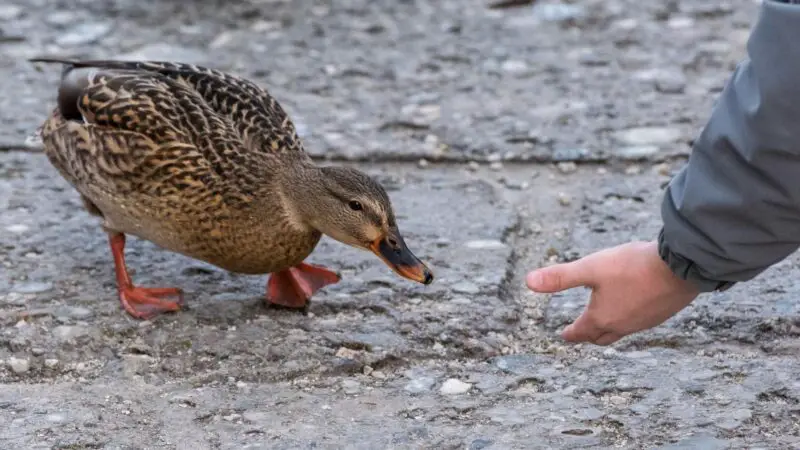
You can train a duck to be a house pet. However, raising ducks as indoor pets is quite different from raising other house pets like cats and dogs.
It’s a fact that ducks aren’t picky about where they sleep. You can leave them in a coop filled with hay and straw, and they’ll fit nicely. You can just imagine how comfortable they will be on carpets and pillows.
Ducks are best suited for outdoor life. To make sure they’re happy, you have to give them enough time to enjoy the outdoors. It is their natural habitat, after all.
Additionally, it’s also worth noting that ducks cannot be potty trained. A duck’s sphincter muscle does not work the same as a mammal’s. As a result, they cannot control when they have to defecate, which can be troublesome for your home.
Are Ducks Good Pets?
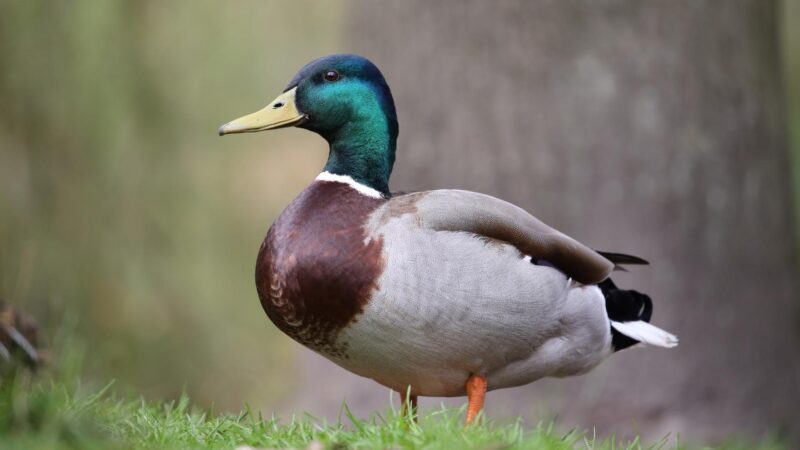
Except for some wild duck breeds, ducks are quite friendly and sociable. In fact, some breeds like the Cayuga and Rouen love being around people and won’t mind being petted or held.
Additionally, ducks are affectionate birds. They love cuddles and being close to you, so you’ll surely feel the love with a duck as a pet.
What Do Pet Ducks Eat?
Ducks are omnivores, so expect to feed them vegetables, small insects, and worms. Food options include chopped lettuce, vegetable peels, corn, frozen peas, oats, and rice. Bear in mind that ducks are forages, so you want to stick to a diet that’s close to what they would naturally eat.
While on the subject of what pet ducks should eat, you should also identify food that they’re not allowed to eat. As much as possible, steer clear of giving them your leftovers.
Human table food is usually cooked with different ingredients and may contain preservatives that give ducks zero nutrition. Similarly, do not be tempted to give them bread and junk food since these will not benefit their health in any way.
Tips for Keeping Ducks as Indoor Pets
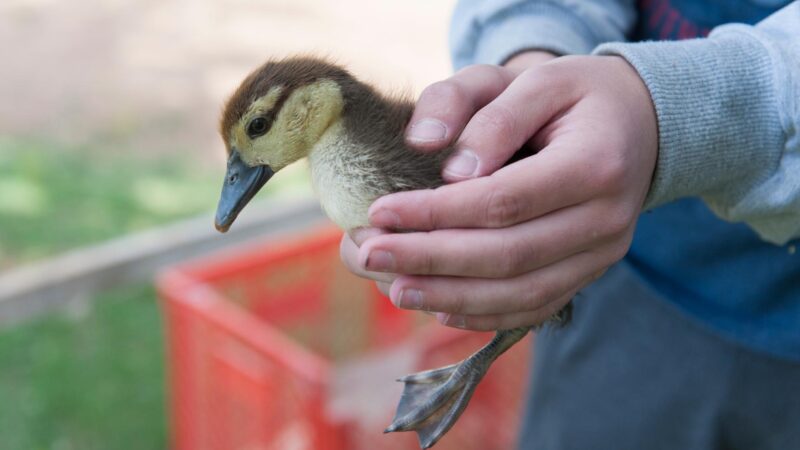
Ducks are most suitable for living outside. However, there are things you can do to make them feel comfortable while staying indoors.
- Make sure your ducks get enough daily outdoor time. This is perhaps the most important thing you can do for your ducks. Ducks love to forage, so make sure that you have a lawn or garden where they can actively walk around. Being outside also gives ducks a chance to soak in their much-needed vitamin D, especially if you’re raising ducklings.
- Have more than one duck at home. Ducks love the company of other ducks, so it’s best to have multiple pet ducks to keep them happy.
- Give them access to enough food and water. Unlike most house pets, ducks do not have a specific feeding time. In the wild, they forage whenever they’re hungry – and it’s your goal to make sure that they always have access to food. Otherwise, you might end up unintentionally starving them.
- Invest in duck diapers. As previously established, ducks do not have the same sphincter muscles that mammals have. This results in an inability to control when they have to poop. To keep them from making a mess in your home, make sure to invest in special diapers that are made specifically for ducks.
- Keep an eye on their toenails. When out in the wild, a duck’s toenail doesn’t grow too long because it often gets scratched on hard surfaces. That’s not the case when they become indoor pets, so you have to trim their toenails from time to time to keep them from growing too sharp or curling.
- Give your ducks enough swimming space. Ducks are waterfowl, so they love going for a swim. This is also part of their grooming process, which is in preparation for their daily naps.
- Give them a comfortable space for grooming and resting. Aside from swimming, ducks also need a clean and dry space for preening after their bath. And once they’re done preening, they need a comfortable spot where they can get some rest.
Benefits of Ducks as Pets
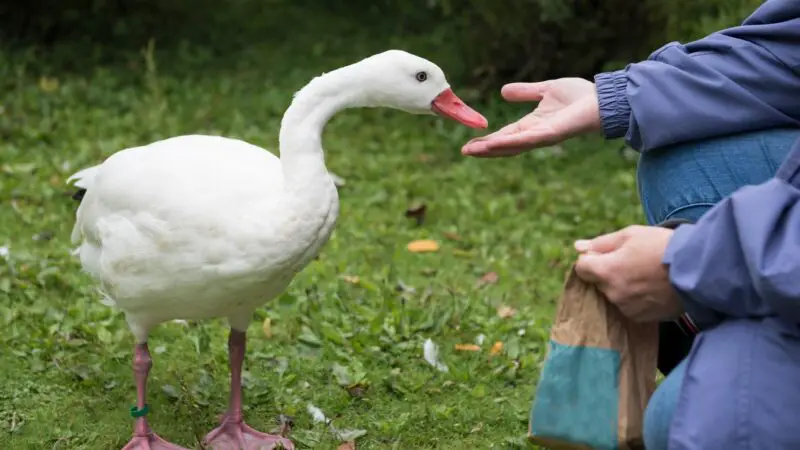
- Ducks are social birds and are quite playful. If you’re looking for a pet that will shower you with cuddles and affection, then ducks will be the perfect pet for you.
- You’ll enjoy a good supply of eggs. Ducks are excellent egg layers. In fact, they have longer laying cycles than chickens, and certain duck breeds can even produce up to 350 eggs per year.
- They’re great at controlling pests, which also results in a healthier lawn or garden. Ducks are foragers. They love feeding on weeds and small insects. This results in a pest-free garden and a well-maintained lawn. You’ll save up on garden maintenance and pest control costs when you have a pet duck.
- The ducks are entertaining. There’s something about ducks that draws you in. They have an adorable waddle, and the things they do are simply fun to watch. You’ll never be bored with a pet duck.
- Duck manure is a great fertilizer. While ducks can’t control when and where they poop, the advantage is that their manure makes great fertilizer. Duck manure is high in plant-friendly nutrients such as potassium, phosphorus, and nitrogen, so it’s bound to help your plants grow.
What to Consider in Making Ducks as Indoor Pets?
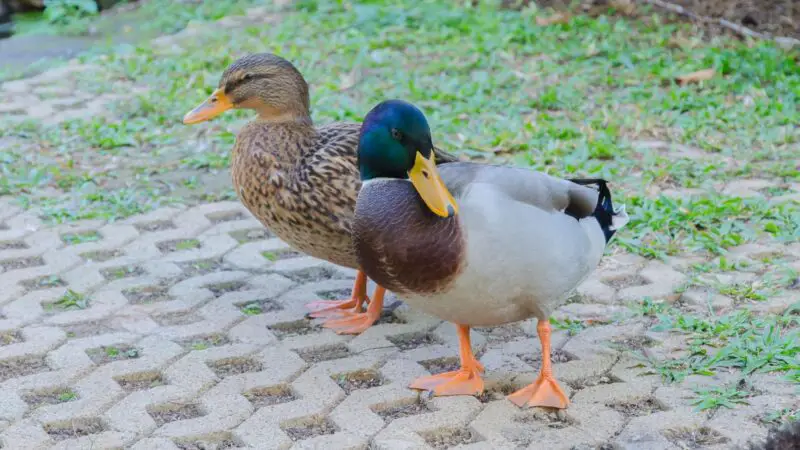
It should be stressed that ducks are not naturally made for the indoor lifestyle. You have to exert extra effort to make sure that they’re safe, comfortable, and happy.
As much as possible, you have to make them feel as if they’re still living outdoors. This includes having enough space for waddling around and enough water to drink and swim in. You should also give them enough outside time to soak in their much-needed vitamin D.
Also, remember that ducks are not solitary animals. You should have at least two ducks indoors so they can be happy together.
Can Ducks Can Bond With You?
Ducks are affectionate birds. They love snuggling with humans and other pets, which allows them to create bonding time with you.
Are Ducks Social?
Ducks are social. They are not solitary by nature, and they love being in the company of others – whether these are fellow ducks, other birds, humans, or other farm animals.
Are Ducks Noisy?
Domestic ducks are generally quiet. Except for certain breeds like the Call duck, most domestic ducks are favored for being quiet. While some can be quite vocal, their quacks are not loud enough to bother your neighbors.
Do Ducks Lay More Eggs Than Chickens?
Ducks lay more eggs than chickens. While chickens are known for laying eggs, ducks produce more eggs in a year. This is due to a duck’s longer laying cycle, so ducks produce around 100 more eggs than chickens in a given year.
Do Ducks Produce Healthy, Quality Manure?
Ducks produce high-quality manure. Studies show that duck manure is a high-quality NPK fertilizer, which means that it contains high levels of nitrogen, phosphorus, and potassium. These are the nutrients necessary for a plant’s healthy growth. That makes duck manure perfect for lawns and gardens.
Do Ducks Get Along With Dogs and Cats?
Ducks can get along with a variety of animals, including cats and dogs. However, bear in mind that dogs and cats have predatory instincts. You have to make sure that your house pets are tame enough to be introduced to ducks. Otherwise, it may cause a lot of stress and harm for your ducks.
Can Ducks Imprint on You?
Ducks can imprint on you. Ducks naturally imprint on their mothers within a few days after they hatch. But, if a duckling was separated from its mother before it hatched, there’s a chance that it may imprint on you. This is especially true if you’re around by the time they hatch. This is called the abnormal imprinting behavior in ducks.
Are Ducks Messy Pets?
Ducks are messy pets. Unlike cats and dogs, ducks can’t be potty trained. They do not have control over when they have to defecate. This can lead to them pooping wherever and whenever.
How Long Do Pet Ducks Live?
On average, pet ducks live between 10 to 15 years. But, the better you take care of your duck, the longer it can live – with some reporting that their ducks live up to 20 years.
Where Can I Buy a Pet Duck?
You can buy a pet duck at a farm that specifically raises ducks. To bond better with your duck, it’s best to buy a duckling that you can raise into adulthood.
Are Ducks Easy to Keep?
Ducks are easy to keep. Despite being messy, ducks are considered low-maintenance pets. They do not need much to survive and are quite resistant to most avian diseases. That makes them easy to care for, especially if you’re a first-time duck owner.
While ducks make great pets, it’s not in their best interests to keep them inside your house. But as long as you know how to properly take care of them while they’re indoors, keeping one inside your home leaves no issue. Still, make sure they get enough time to roam outside and get enough sunlight to ensure their optimum health.
